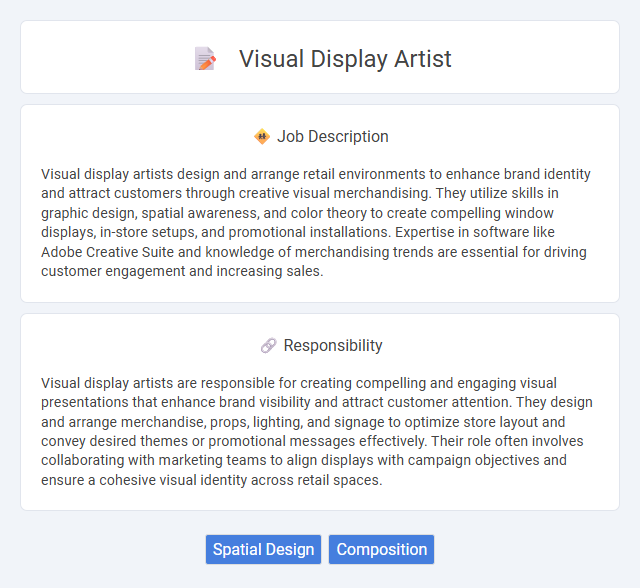
Visual display artists design and arrange retail environments to enhance brand identity and attract customers through creative visual merchandising. They utilize skills in graphic design, spatial awareness, and color theory to create compelling window displays, in-store setups, and promotional installations. Expertise in software like Adobe Creative Suite and knowledge of merchandising trends are essential for driving customer engagement and increasing sales.
Visual display artist jobs likely suit individuals with strong creativity, an eye for detail, and physical stamina due to the hands-on nature of setting up displays. Those who enjoy working with colors, materials, and spatial arrangements may find this role fulfilling, while people with limited physical mobility or low tolerance for repetitive tasks might struggle. It is probable that candidates who thrive in dynamic environments and can collaborate with marketing or retail teams will excel in this position.
Qualification
Visual display artists require strong creative skills combined with proficiency in design software such as Adobe Creative Suite, including Photoshop and Illustrator. A background in visual merchandising, graphic design, or fine arts is essential, often supported by a diploma or bachelor's degree in these fields. Experience in spatial arrangement, color theory, and materials handling enhances their ability to create engaging and effective visual displays.
Responsibility
Visual display artists are responsible for creating compelling and engaging visual presentations that enhance brand visibility and attract customer attention. They design and arrange merchandise, props, lighting, and signage to optimize store layout and convey desired themes or promotional messages effectively. Their role often involves collaborating with marketing teams to align displays with campaign objectives and ensure a cohesive visual identity across retail spaces.
Benefit
Visual display artists likely enjoy benefits such as creative freedom to design engaging retail environments that enhance customer experience and drive sales. They probably gain opportunities for professional growth through collaboration with marketing teams and exposure to industry trends. Competitive salaries and potential bonuses may also be common, reflecting the value of their unique artistic skills in retail success.
Challenge
Visual display artist roles often present challenges that require creative problem-solving and adaptability to evolving design trends. The probability of encountering tight deadlines and client-specific demands may push artists to innovate under pressure. Success in this field likely depends on balancing artistic vision with practical constraints while continuously improving technical skills.
Career Advancement
Visual display artist roles offer clear pathways for career advancement through gaining expertise in design software, spatial arrangement, and consumer psychology. Progression often involves moving from entry-level positions to senior visual merchandiser or creative director roles, requiring leadership skills and a proven track record of successful retail displays. Enhancing knowledge in brand strategy and digital visualization tools also increases opportunities for managerial positions within fashion, retail, and advertising industries.
Key Terms
Spatial Design
Visual display artists specializing in spatial design create immersive environments that enhance brand storytelling and optimize customer engagement through strategic layout and aesthetic composition. They utilize principles of spatial planning, color theory, and lighting to transform retail and exhibition spaces into visually compelling experiences that guide visitor flow and highlight key products or messages. Expertise in 3D modeling software and an understanding of human interaction with physical spaces are essential skills for crafting functional and attractive visual displays.
Composition
Visual display artists excel in composition by strategically arranging elements to create visually compelling and balanced designs that capture consumer attention. They manipulate color, space, texture, and focal points to guide viewer perception and enhance brand messaging in retail or exhibition settings. Mastery in composition techniques such as the rule of thirds, symmetry, and contrast directly impacts the effectiveness of visual merchandising and customer engagement.
 kuljobs.com
kuljobs.com